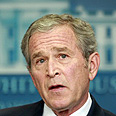Erekat stressed that the Palestinian leadership is waiting for an official statement from Netanyahu regarding the principle Obama outlined in his speech, despite the fact that the prime minister has already rejected the US proposal saying that 1967 borders were indefensible.
"If Netanyahu agrees, we shall turn over a new leaf. If he doesn't then there is no point talking about a peace process. We're saying it loud and clear."
Despite being slammed for his Mideast speech both in the US and Israel, Obama is not the first president to discuss negotiations based on 1967 lines. In a press conference in 2005, then US President George Bush said that both sides must agree on any change to the 1949 armistice lines. These are same lines as the 1967 borders.
Standing alongside Palestinian President Mahmoud Abbas, Bush said that "A viable two-state solution must ensure contiguity on the West Bank, and a state of scattered territories will not work.
"There must also be meaningful linkages between the West Bank and Gaza. This is the position of the United States today; it will be the position of the United States at the time of final status negotiations."
Obama reiterates stance
Meanwhile, Obama reiterated his stance in an interview with the BBC.
"The basis for negotiations will involve looking at that 1967 border, recognizing that conditions on the ground have changed and there are going to need to be swaps to accommodate the interests of both sides," Obama said.
Hamas' foreign ministry issued a statement saying that Israel was deepening its aggressive positions against any political solution claiming Netanyahu does not genuinely want to achieve a two-state solution.
"The categorical rejection of 1967 lines and the right of return, and the hanging on to Jerusalem as Israel's capital destroy the foundations of peace negotiations," a statement said. Hamas called on the PA to reconsider it position.
Yizthak Benhorin contributed to this report
- Follow Ynetnews on Facebook



















